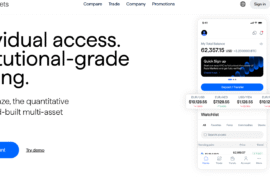
7 Red Flags about PCP-Claims.org and the Reality of Coin Recovery Platforms
7 Red Flags about PCP-Claims.org and the Reality of Coin Recovery Platforms
Introduction
In the evolving digital economy, crypto investors face both opportunity and risk. Fraudulent schemes, lost wallets, and platform failures have left countless victims searching for answers. Many turn to websites advertising themselves as a coin recovery platform, such as PCP-Claims.org, which claims to assist in regaining stolen or misplaced digital assets.
But what do these promises really mean? Can the coin recovery success rate truly be trusted? And do published coin recovery case studies reflect reality or simply act as marketing tools? This article provides a structured analysis of PCP-Claims.org and offers a practical guide for investors who value safety, clarity, and genuine results.
1. Understanding Coin Recovery Platforms
A coin recovery platform positions itself as a professional service designed to retrieve lost or stolen digital assets. In theory, these companies utilize blockchain forensics, transaction tracing, and technical tools to recover tokens from scams or misdirected wallets.
However, the crypto industry is largely unregulated. As a result, not every platform delivers what it promises. For sites like PCP-Claims.org, investors should carefully examine credibility before sharing sensitive data or funds.
2. The Power of Coin Recovery Success Rates
One of the most persuasive elements in marketing is the advertised coin recovery success rate. A legitimate company should provide verifiable statistics, ideally supported by independent audits or customer testimonials.
Platforms without transparent reporting may exaggerate their success rates to attract victims of crypto fraud. Investors must remain skeptical of inflated percentages without proof.
3. Coin Recovery Case Studies: Fact or Fiction?
Case studies are often displayed to build trust. PCP-Claims.org, like other recovery sites, may highlight “client success stories” to demonstrate results. But without verifiable blockchain transaction records, these so-called coin recovery case studies risk being nothing more than fabricated marketing.
Savvy investors should always request transaction IDs or evidence on public blockchains to confirm that recovery efforts are legitimate.
4. Red Flags to Watch For
When assessing PCP-Claims.org or any other coin recovery platform, beware of:
- Upfront fees before services are delivered.
- Guarantees of 100% recovery (impossible in crypto).
- Poorly detailed coin recovery case studies without technical transparency.
- A lack of independent reviews or third-party verification.
Spotting these warning signs can save investors from becoming repeat victims.
5. Genuine Recovery Methods
True recovery efforts rely on a mix of:
- Blockchain forensic analysis.
- Cooperation with exchanges and law enforcement.
- Smart use of case study data from previous incidents.
These methods provide a realistic—though not guaranteed—chance of regaining lost assets. Honest providers will clarify that coin recovery success rates vary depending on the complexity of each case.
6. Prevention as the Best Defense
Even the best coin recovery platforms cannot ensure total success. That’s why prevention remains the ultimate safeguard. Investors should secure private keys, use hardware wallets, enable multi-factor authentication, and avoid platforms without proper licensing.
Understanding both coin recovery terminology and the mechanics of fraud makes users less vulnerable in the future.
7. Reporting and Documentation
Whether dealing with PCP-Claims.org or another platform, users should carefully document every detail of their losses. Recording wallet addresses, transaction hashes, and support communications creates a personal case study that can be used both for recovery attempts and potential legal claims.
This documentation improves the chances of success and helps law enforcement agencies track fraudulent actors.
Conclusion
The rise of sites like PCP-Claims.org highlights a growing demand for crypto recovery services. Yet, not every coin recovery platform is created equal. Many prey on desperate investors, offering exaggerated coin recovery success rates and fabricated coin recovery case studies to lure in new victims.
A genuine recovery platform will always manage expectations. It will clarify that success depends on multiple factors—transaction complexity, blockchain transparency, exchange cooperation, and timing. There are no magic shortcuts.
For investors, the key lies in education and vigilance. Before engaging any service, verify claims with blockchain evidence. Study case studies critically, and ask for verifiable proof instead of relying on testimonials alone. Most importantly, treat any promise of guaranteed results as a red flag.
While PCP-Claims.org positions itself as a solution, potential users should conduct deep due diligence before sharing funds or sensitive data. At the same time, crypto investors must focus on prevention: secure storage, multiple backups, and regular audits reduce the likelihood of needing recovery in the first place.
In the end, the crypto ecosystem rewards the cautious. By understanding the truth about coin recovery platforms, analyzing realistic success rates, and critically evaluating case studies, investors can protect themselves against both scams and the false hope of easy recovery. Knowledge, vigilance, and preparation remain the strongest tools in navigating this complex space.








